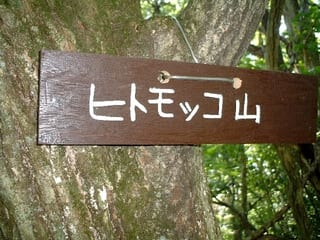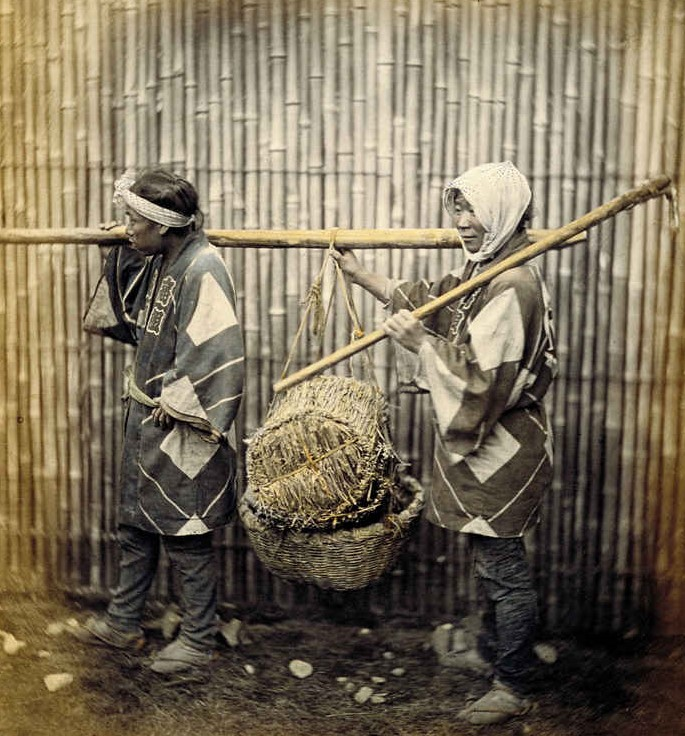
むかし、国中の神さまたちが国づくりをすることになりました。「大きな山と、大きなみずうみをつくりたいなあ。」と、ひとりの神さまがいいました。「それはいいことだ。それなら、日本一高い山と、日本一大きなみずうみをつくろう。」と、ほかの神さまがいいました。
Long ago, all the gods throughout the nation decided to build a country. "I want to make a big mountain and a big lake," said one god. "That's a good idea. If we do, let's make the biggest mountain and the biggest lake in Japan," said another god.
すると、水の神さまが、「大きなみずうみなら、近江の国のまん中につくりたいなあ。」と、いいました。それを聞いて、山の神さまがいいました。「その土を運んで、駿河の国(静岡県)に山をつくろう。」
After that, the water god said, "If we make a big lake, I want it to be in the middle of Omi Province*." Hearing that, the mountain god spoke. "Let's carry that dirt to Suruga Province (Shizuoka Prefecture) to make the mountain."
ただ、どの神さまも、日本中のたくさんの山や川をつくらなければならないので、いっしょにつくる日が決まりません。
But, because every god needed to make the many mountains and rivers throughout Japan, a day that they could work together wasn't decided.
話がまとまらず、とうとう火の神さんが西の空へ沈む時間になってしまいました。
Without finding a resolution, the time for the god of fire to set in the western the sky finally came.
月の神さまは考えた末にいいました。「どうだろう。わたしが月の光で照らしてあげるから、今からすぐ仕事をしようよ。」
After thinking, the moon god spoke. "Hmm... I shine with the light of the moon, so we should get to work soon."
「うん、そうだなあ。それなら火の神さまがもどってくるまでにできるなあ。」と、ほかの神さまも賛成しました。
"Yeah, that's true. I wonder if we could do it before the sun god returns," another god agreed.
火の神さまが西の空に姿を消すと、月の神さまが空の上で、近江と駿河の国の間を明るく照らしました。
When he fire god's form disappeared from the western sky, the moon god shone brightly in the sky between Omi and Suruga Provinces.
神さまたちは土の神さまから、荷ない棒ともっとをもらい、二人一組になって、近江の国の土をもっこに入れて、荷ない棒にになって、駿河の国へ運び始めました。みるまに、駿河の山は高くなり、近江の国には大きな穴があきました。
The gods received carrying sticks** from the earth god and got into groups of two. They put the soil from Omi Province into baskets** and began carrying the sticks on their shoulders to Suruga Province. The Suruga mountain quickly became tall, and Omi Province had a large hole.
ところが、もうひともっこ運びだせば、日本一の山とみずうみができるという時、火の神さまが東の空から顔をだしたのです。
However, when it was time for one more basket to be carried out to make the biggest mountain and lake in Japan, the fire god showed his face from the eastern sky.
月の神さまはあわてて、西の山にかくれてしまいました。
In a hurry, the moon god covered the western mountain.
その時、最後のひともっこを運びだそうとしていた一組の神さまたちはその急な変化にびっくりして、ひっくりかえってしまいました。荷なっていたひともっこの土はこぼれおちてしまいました。その『ひともっこ山』が長浜の田村山だそうです。
At that moment, the last pair of gods that were trying to carry the last basket were surprised by the sudden change and fell down. The soil in the basket that they were carrying was scattered. It is said that that "one basket mountain"*** is the Tamura Mountain in Nagahama.
また、日本一高い富士山の頂上はひともっこ分だけ土がないから平らなんです。
Still, the peak of Japan's tallest Mt. Fuji is flat because it is missing the soil from that one basket.

*Omi Province is the old name for Shiga Prefecture
**An old fashioned way of moving heavy materials in Japan was to use a basket called a mokko on a long stick that was carried by two people to share the load.
***From my understanding, the lake the gods were making was Lake Biwa and the mountain was Mt. Fuji. The "one basket mountain" or hito mokko yama was intended by the gods to be the peak of Mt. Fuji, but the last basket of soil that was dropped created the smaller Tamura Mountain in Nagahama. Shizuoka, which is where Mt. Fuji is located, seems to have a different version of the story, as most folktales differ by region.